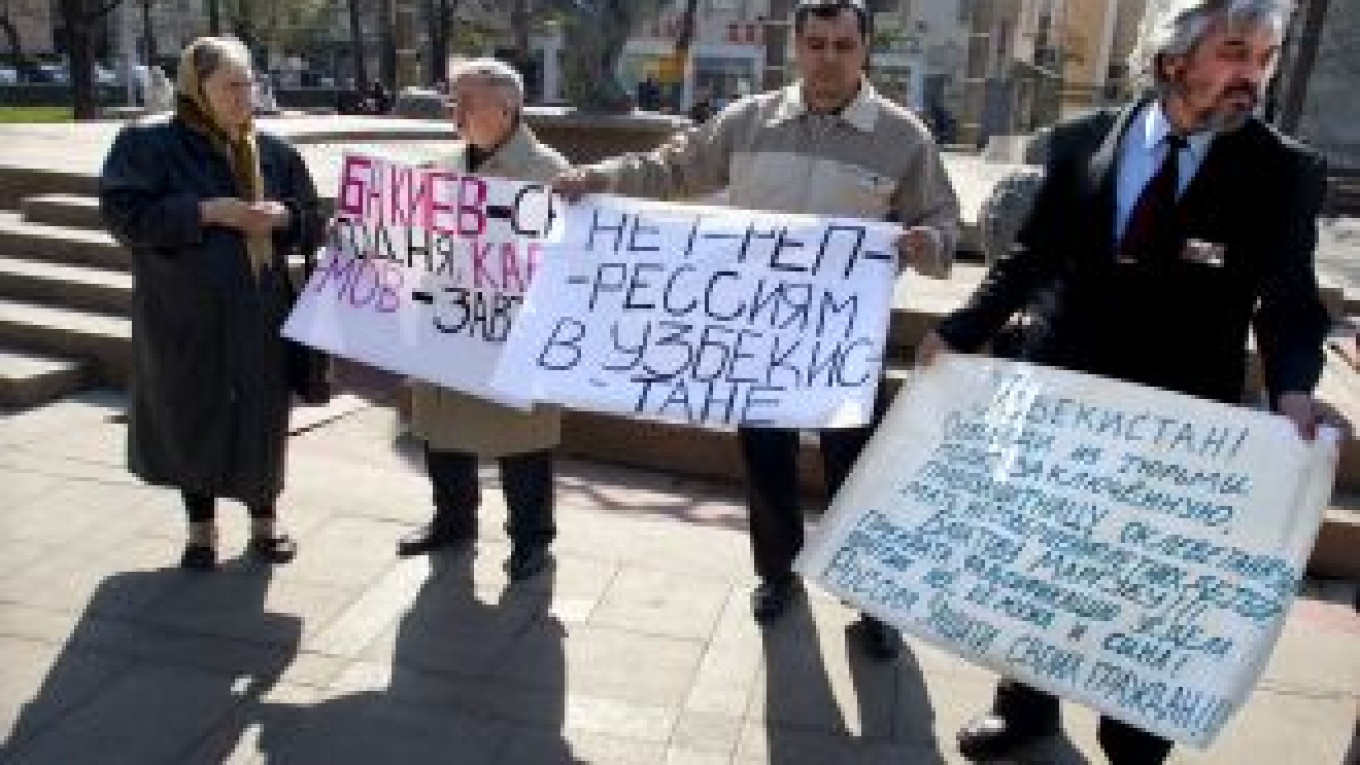Uzbek President Islam Karimov met with President Dmitry Medvedev late Monday for informal talks outside Moscow, becoming the first Central Asian leader to visit Russia since a violent uprising in Kyrgyzstan ousted its leader two weeks ago.
Kremlin spokesman Alexei Pavlov declined to comment on the evening meeting at Medvedev's Barvikha residence. Both leaders will sign bilateral agreements during formal meetings on Tuesday, Pavlov said, without elaborating.
As Central Asia's most populous country, Uzbekistan is a key player in the region, and its authoritarian government has recently sparred with Moscow over a number of issues. But Karimov, who has governed his country with an iron fist since its independence in 1991, has a good chance of maintaining his strategy of balancing Russian and U.S. interests in the region, analysts said Monday.
"Nobody is interested in worsening relations, and [Karimov] will basically continue a multivector policy," said Alexander Malashenko, an analyst with the Carnegie Moscow Center.
Like Kyrgyzstan, Uzbekistan is viewed as a strategic asset both in Washington and in Moscow. In 2001, the United States opened an air base in Karshi-Khanabad in the south of the country to ensure supplies for its operations in Afghanistan. The Uzbek government shut the base in 2005 in the wake of Western criticism over a violent government crackdown on demonstrators in the town of Andijan.
But ties with the United States have improved significantly since then, and U.S. military dignitaries have been regular visitors in Tashkent, the Uzbek capital. The latest was Central Command chief General David Petraeus, who met with Karimov on April 6, the U.S. Embassy said on its web site.
Meanwhile, relations with Moscow have suffered as Karimov has snubbed some of the Kremlin's main regional cooperation projects. In 2008, Uzbekistan withdrew from the Eurasian Economic Community, a fledgling customs union between three Central Asian Nations, Belarus and Russia, shortly after the European Union lifted sanctions imposed in 2005 because of the Andijan crackdown.
Last year, Tashkent declined to join a new NATO-style rapid reaction force set up by the Collective Security Treaty Organization, a Moscow-led military alliance among former Soviet republics. Media reports suggested that Karimov was irked by Russian plans to build a second military base in Kyrgyzstan near Uzbekistan’s eastern border.
In the wake of this month's Kyrgyz revolution, Russian government officials have lobbied for the closing of the U.S. air base in Manas, near the Kyrgyz capital, Bishkek. Analysts have suggested that Kurmanbek Bakiyev, Kyrgyzstan's ousted president, lost Kremlin support last year after prolonging the rental agreement for the United States in Manas despite his earlier promises to close it.
Uzbek state-controlled media were largely silent as the revolt unfolded in Kyrgyzstan on April 6.
Russia was the first country to recognize the new Kyrgyz leadership immediately following Bakiyev's ouster on April 8.
Four protesters gathered at Moscow's Novokuznyetskaya metro station on Monday to demand that Karimov be ousted like Bakiyev. They held signs reading, "Bakiyev Today, Karimov Tomorrow" and "No to Repression in Uzbekistan."
But Karimov need not fear that Moscow will turn against the entrenched leader, said Azhdar Kurtov, an analyst with the Russian Institute of Strategic Studies.
"Uzbekistan wants Moscow to support its position. That will be the most important point on Karimov's agenda," Kurtov added.
He said the Uzbek government has long sparred with Bakiyev over controversial hydropower projects in Kyrgyzstan. Downstream Uzbekistan, as well as Turkmenistan and Kazakhstan, are concerned that the planned dams will block water that they need for irrigation during the summer.
Moscow has angered Tashkent by promising financial aid to help construct the Kambarata dam on the Naryn River.
A Message from The Moscow Times:
Dear readers,
We are facing unprecedented challenges. Russia's Prosecutor General's Office has designated The Moscow Times as an "undesirable" organization, criminalizing our work and putting our staff at risk of prosecution. This follows our earlier unjust labeling as a "foreign agent."
These actions are direct attempts to silence independent journalism in Russia. The authorities claim our work "discredits the decisions of the Russian leadership." We see things differently: we strive to provide accurate, unbiased reporting on Russia.
We, the journalists of The Moscow Times, refuse to be silenced. But to continue our work, we need your help.
Your support, no matter how small, makes a world of difference. If you can, please support us monthly starting from just $2. It's quick to set up, and every contribution makes a significant impact.
By supporting The Moscow Times, you're defending open, independent journalism in the face of repression. Thank you for standing with us.
Remind me later.


